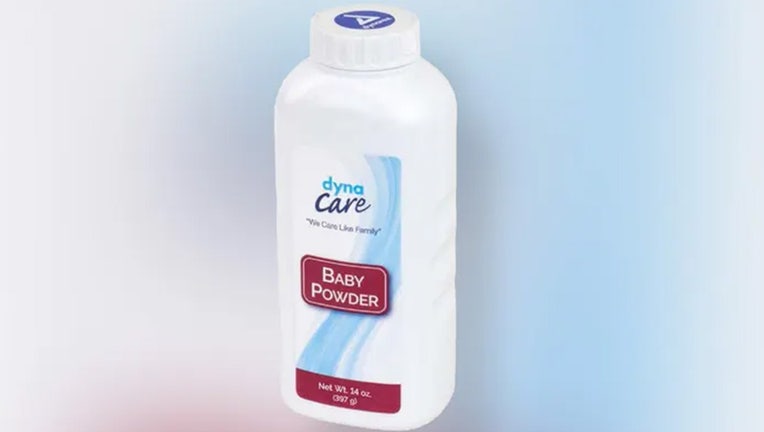Recall expanded for Dynacare Baby Powder due to potential asbestos contamination

Dynarex Corporation's initial recall included 62 cases of item number 4875, Dynacare Baby Powder, Batch Number B 051, because it has the potential to be contaminated with asbestos. (FDA)
Dynarex Corp. has expanded its recall of Dynacare Baby Powder due to potential asbestos contamination, the U.S. Food and Drug Administration said on Monday.
Which baby powder products are being recalled?
The expanded recall includes an additional 373 cases of item No. 4875, Dynacare Baby Powder (14 oz.) and 647 cases of item No. 4874, Dynacare Baby Powder (4 oz.).
The initial recall included 62 cases of Dynacare Baby Powder with batch No. B 051.
The baby powders in batches 4875 and 4874 were packaged in plastic bottles and came in 24-packs of 14 oz. bottles and 48-packs of 4 oz. bottles.
The batch numbers should be located on the bottom of the bottles and on each case, the FDA said.
Where were the baby powders sold?
The baby powder products included in the recall were sent to distributors on or after Jan. 18, 2024 to the following states:
- Alabama
- Arkansas
- Arizona
- California
- Colorado
- Delaware
- Florida
- Georgia
- Iowa
- Illinois
- Indiana
- Kentucky
- Louisiana
- Massachusetts
- Maryland
- Minnesota
- Missouri
- Mississippi
- Montana
- North Carolina
- Nebraska
- New Jersey
- New Mexico
- New York
- Ohio
- Oklahoma
- Oregon
- Pennsylvania
- Tennessee
- Texas
- Utah
- Virginia
- Washington
- Wisconsin
The baby powders were also sold on Amazon.com.
How to get a refund
If you purchased baby powder that is part of this recall, contact Dynarex Corp. at 888-396-2739 or 845-365-8200 between 8:30 a.m. and 5 p.m. ET.
You can also email the company at recall@dynarex.com.
What is asbestos?
According to federal officials, asbestos is a naturally occurring mineral that is often found near talc, an ingredient in many cosmetic products. During talc mining, there is a risk that talc may be contaminated with asbestos.
The Centers for Disease Control and Prevention (CDC) warned that breathing in asbestos can cause tiny asbestos fibers to irritate lung tissue.
Studies show that breathing in asbestos can cause non-cancer diseases, like asbestosis and pleural disease.
However, exposure to asbestos can also increase the risk of developing certain cancers such as lung cancer and mesothelioma, according to the CDC.

